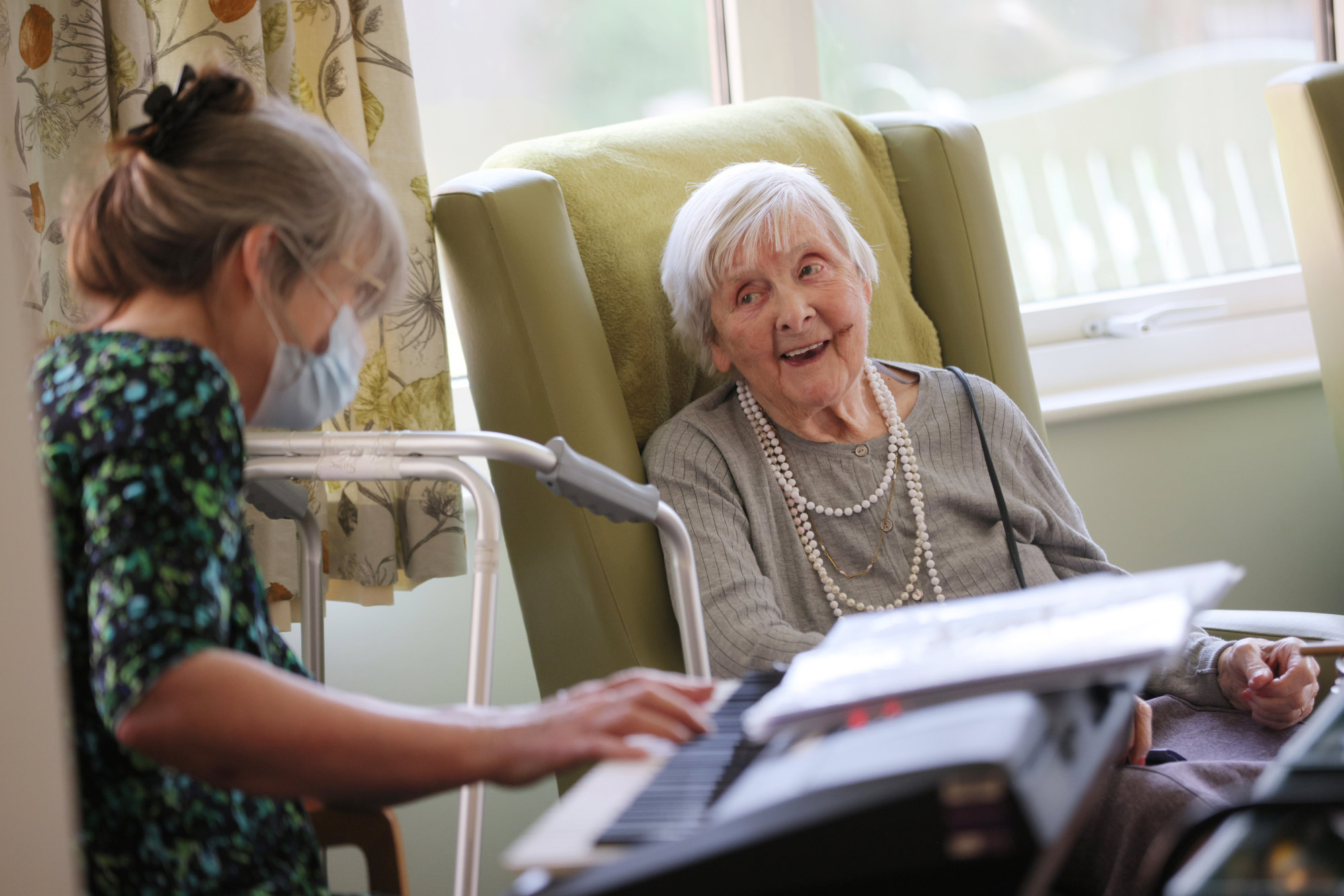
How music touches dementia patients, bringing back memories and abilities believed to have been lost – experts explain
- ‘Sometimes the results can be extraordinary and profoundly moving,’ says woman in UK working to bring music to people affected by dementia
- Playing familiar pieces of music ‘opens up communication opportunities’ in people with dementia, says Hong Kong researcher behind a music-and-movement programme
A kind reader wrote to express gratitude for the Post’s series of articles on dementia. He was 85 years young and still active, although only going to the gym “four times a week now”, which made me smile. In his spare time, he listens to music CDs.
We need to talk about music and dementia, he wrote. And he is right: more and more, studies show that listening to music is both good for our brain health and can play a positive role in dementia care.
Keep your brain sharp with the heart-healthy Mediterranean or Mind diets
“Music is received in the hippocampus and amygdala, the areas of the brain associated with emotion and memory, which is why it can have such powerful effects on people living with dementia,” she says.
“If you perform a brain scan of someone listening to music, the screen will light up like a fireworks display. If parts of the brain are damaged, the music can still reach other parts, sometimes bringing back memories and even abilities thought lost.”

Musicians from The Spitz Charitable Trust, a London-based charity that brings professional musicians into care homes, day centres and hospitals to help overcome loneliness and isolation in residents and patients, offered to play for John.
He resisted for a bit, but eventually relented. The caregiving team noticed how well he responded to the music, clapping to the beat and “conducting” the music from his bed.

After seven months of bedside playing, John was encouraged to leave his room for the first time to attend a music session in the care home gardens. The following day, he asked the foundation for a guitar and some lessons.
Nearly a year and a half after his admission, John played in a music session at the home; five years on, he is a regular at group music sessions and “the life and soul of the party”, Metcalfe says.
“Music has been truly transformational to John’s well-being.”
Why you have to keep smiling at a dementia patient – they might smile back
“But sometimes the results can be extraordinary and profoundly moving,” she says. “People who cannot walk may dance. People who have not spoken may sing. People who have withdrawn into themselves may lift their heads, make eye contact and engage again with loved ones.”
While she acknowledges music is not the whole answer, “it can divert from a difficult moment, bring people together and create moments of joy. Sometimes those moments can be enough to turn a day around and make all the difference”.

This is not just important for sufferers, it is vital for their carers, too: their days might be made a little less difficult, a little more joyful.
This was part of the inspiration for popular UK actress Vicky McClure, who had helped take care of her grandmother who had dementia, to set up Our Dementia Choir. It brought together people living with dementia in Nottingham, the city of her birth in the English Midlands, to see whether music could make a measurable difference to their lives.
As part of a BBC documentary created in 2018, choir members took part in scientific studies to measure their emotional and physical responses to singing. The choir performs in concerts, often with guest celebrity entertainers, and at tea parties in care homes and at private events.
Why this Cantopop song can help you sleep better (it’s the tuning forks)
Psychologists have discovered that we create more memories between the ages of 10 and 30 than at any other point in our lives, Metcalfe says.
People are able to enjoy new music throughout their lives, though, no matter when they are exposed to it, and respond emotionally to new musical experiences – “including live performances, drumming, music-making or just the pleasure of singing with others in a choir or group”.

Music therapy is practised by trained musicians who understand how to harness music to create a form of language and dialogue between the therapist and the person living with dementia. This is key when a dementia sufferer begins to lose their words.
It can be helpful in soothing or distracting agitated patients – and agitation is common in dementia.
Dr Daphne Cheung, an associate professor in the School of Nursing at Hong Kong Polytechnic University, and her team developed the Music with Movement initiative. It is not therapy, she explains, but a psychosocial intervention for promoting well-being in older people with cognitive impairment.
Hong Kong-designed music and dance classes boost dementia sufferers’ mood
It incorporates music and online augmented reality games, to engage them. The music used in this case is music familiar to them – “and the movement is designed to engage them in the intervention with a cognitively stimulating element”.
Music is preferred, she says, because it lasts longer in the memories of people with dementia, as many studies have found.
“They may forget recent events but still remember ‘the oldies’,” says Cheung. Playing these familiar pieces of music “opens up communication opportunities”, including those for verbal communication.

When they move their body to the music, they are found to be more engaged and stimulated. The music also has soothing effects.
Many studies report that music-based interventions have positive effects on behaviour, mood and emotion. In 2018, researchers from Chinese University of Hong Kong reviewed 38 trials of music therapy among people with dementia.
They found that participants benefited from “receptive music therapy”, with less agitation and fewer behavioural problems, compared with “usual care” without this therapy.
How the brain works and how to keep it healthier for longer
The key to music’s success, as demonstrated by such studies and reflected in the efforts of The Spitz and Cheung’s Music with Movement, is that the choice of music is personalised and meaningful to the individual.
Heavy metal may be just as transformative to one person as blues and jazz are to another. And many of these activities, especially when delivered in a group scenario, encourage a spirit of togetherness which is particularly important in the isolating world of dementia.
A growing number of studies demonstrate the positive links between music, healthy cognition and better attention spans.
Some studies show improvements in autobiographic memory among elderly people who regularly had music from the 1920s and ’30s played to them – those “oldies” Cheung speaks of. They seemed more alert and happier afterwards, and demonstrated better recall of personal history.
Some research suggests music may even promote better brain physiology; there is evidence that music builds brain plasticity, something which has been noted in brain differences between musicians and non-musicians.
As Metcalfe and Cheung both observe, music listening involves the whole brain – and that is important to brain health.

Fatma Makalo, manager of John’s care home in London, is certain that the live music and guitar lessons he participates in from The Spitz have significantly improved his quality of life.
“Through music, we got to know John’s life history, we got to know who John is, and now he’s such a fun person to be around,” Makalo says.
“It’s five years’ on, he’s still here with us and I think we’re going to get many more years to come with John.”











